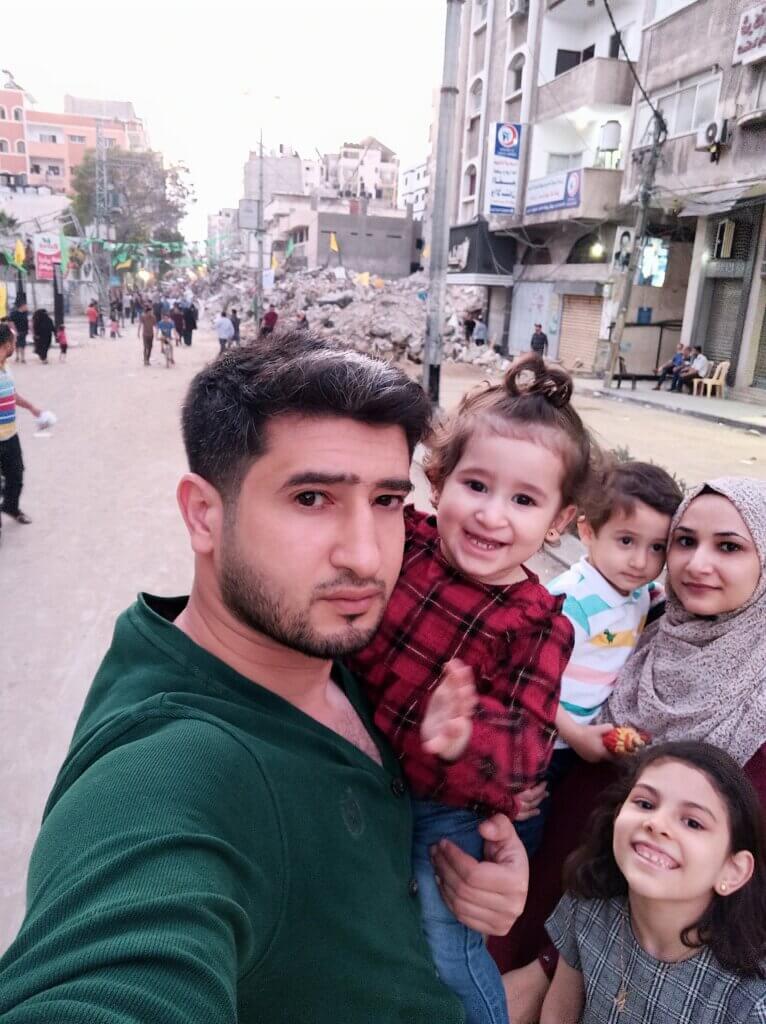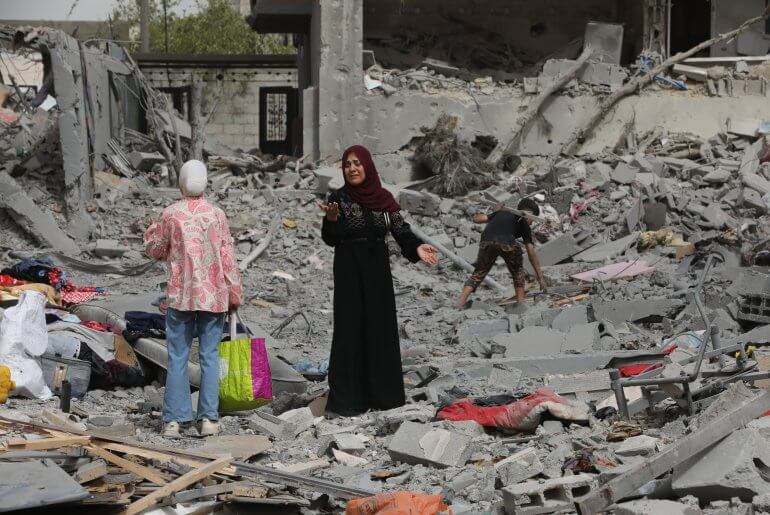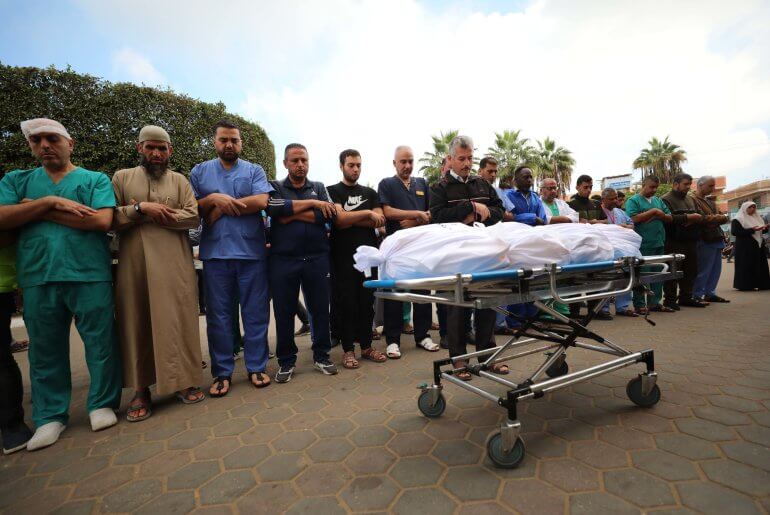
Editor’s Note: The article is part of our series Gaza Diaries which shares firsthand accounts of Palestinians who lived through the 11-day Israeli attack on Gaza in May 2021, and are now dealing with its aftermath. You can read the entire series here.
In the middle of the night, exactly one month ago, I had an altercation with my husband: I wanted to leave our house, but he was determined to stay.
The consequences of this debate couldn’t be larger. It was the third night of the airstrikes in the 11-day escalation between Gaza and Israel in May. That night our area witnessed the most intense bombings since the beginning of the conflict on May 10. The Israeli army targeted sites in the north, around what we locally call the Sudanese area with nearly 200 missiles, which was about half an hour from our home.
We could feel the impact from our bedroom. I lost control over myself and freaked out. I prepared a small bag in which I kept our important documents, including our marriage certificate, ID cards, real estate deed, and degrees. I also tucked in new clothes for our children that I bought for the Eid holiday that falls at the end of Ramadan.
As I organized the bag, I picked up our youngest who is almost 2 years old, and sat in the corner of our apartment, bidding farewell to each part of the room. I had a flashback of us, making this home together. No one knows how much effort it took for us to build it.
Amongst the things I kept looking at was the sofa bench that my mother gifted us on our wedding anniversary five years ago, and a white drawing frame with ears of wheat hanging in the middle of the house. I even said goodbye to the flower beds that decorate the balcony. Every single thing in the house seemed too special to leave behind.
Still, I insisted on evacuating. I watched many families flee their houses and finally my husband and I formed an agreement. He would stay at home, while our baby and I would head in the morning to my uncle’s house in the center of Gaza City.
My husband said he refused to come with us for two reasons. First, he was adamant that there was no safe place in Gaza. The Israeli army was targeting locations all over the besieged territory. Second, he said he would not leave the house that we worked hard to build. Our house means a lot to us. We share memories in every corner and the sentimental value cannot be matched by any material price. My husband swore to me that he would not leave the house unless he was dead.
Yet, I didn’t pay attention to what my husband exactly said. My mind was occupied thinking about how I can keep my children, Khalil and Saba, safe.
About a week and a half later and after a ceasefire was signed, I started to hear horror stories of those who lost their homes in airstrikes. Only then I realized what my husband meant about the value of our house.
In numbers, 1,800 housing units in Gaza were completely demolished as a result of the Israeli bombing, along with 16,800 others partially damaged to varying degrees, according to Gaza’s housing ministry.
What is beyond being counting, is the scores of memories that were cultivated inside each of these houses. Each home tells a story and expresses a journey.
What is beyond being counting, is the scores of memories that were cultivated inside each of these houses. Each home tells a story and expresses a journey.
I firmly believe that the house is not just brick and walls, rather it is a kingdom for mankind. The essence of comfort and family is found within the home. Without any doubt, material loss is painful, but psychological pain is harder.
This is what I found when I spoke with families whose houses were destroyed in bombings. Below is a synopsis of those conversations.
The artist’s house
My friend, a writer, photographer, and plastics artist, Bissan Harb, is 30 years old. She is a newlywed, married to Sameh Al-Borai, 34, at the end of 2020. Due to the pandemic, the couple had to marry without celebrating or a public wedding ceremony.
Bissan and Sameh both work for a Norwegian charity for Palestinian refugees. The groom, Sameh, insisted on making his bride happy, so he hung Bissan’s artwork in a corner in the front of his apartment. Bissan then placed at least 15 of her paintings in that corner. This gave their newly built house a unique beauty, showing the talent and creativity of Bissan and Sameh’s love and care.
Then on May 18, at 2:30 a.m., Bissan and Sameh escaped from their home nearly one minute before the Israeli jets dropped a bomb on the house next to them, five yards away. That house belonged to a doctor, Asaad Tabeel, and consisted of three floors.
The house with hit with three heavy missiles and the impact reduced it to ash.
She told me: “For a whole year we have prepared the house together. Despite its small area, I felt that it was larger than the entire universe. In a blink of an eye, Israel brought us back to zero, we have to start over again.”
When hostilities ended, Bissan returned to the home. The first thing she headed to was the corner that had her art collection and keepsakes.

“I started looking for my old memories, pieces of work that are related to the past and the authenticity of my personal history and the history of the Palestinian cause. Most of my works were destroyed. I found only three pieces. I retrieved them from the rubble and washed the smell of gunpowder from them. The color of the water was black, like a black thread. This was my life completely at that moment, I am now a black water streak, I don’t know when I’ll go back to my normal color.”
Among the things that Bissan longs for which was burned in the bombing is a photo of her uncle and aunt that was placed on a metal plate. That picture was about 50 years old.
“Israel burned that picture. Israel succeeded in burning my family’s history. It succeeded in burning our memories.”
Bissan Harb
Bissan said, “Israel burned that picture. Israel succeeded in burning my family’s history. It succeeded in burning our memories.”
I know Bissan very well. She is a very calm and talented young lady.
When she holds a camera, she tries to show a beautiful face to Gaza. When she writes, she tries to show the resilience of Palestinians. When she sculpts and draws, she expresses authentic feelings. Bissan was the light in the darkness for everyone around. That’s why I expected her to come back with full energy again. I would describe her as the companion of light.
From rubble to paintings
Saja Moussa, a 26-year-old artist from Rafah turned some parts of her destroyed house into paintings. The young woman produced 13 paintings.
She actually succeeded in turning her destroyed room into an art gallery, each painting carrying a different message, including steadfastness and survival, pain and hope, wreckage and survival, and other pieces that have this sentence written on them: “We will stay here.”
She says, “There are those who are killed in the aggression, others are injured, and there are people whose memories are obliterated. No one knows how many memories were obliterated in Gaza within 11 days.”
A family of doctors
My husband wrote an article about what his friends were experiencing during the recent escalation in Gaza. Among the stories he tackled is the story of his friend, a 28-year-old doctor, Taher Al-Madhoun.
Taher’s house and other seven houses were destroyed in one moment in northern Gaza in an airstrike on May 13 His mother and father were killed, and the entire house was destroyed.
Taher was in the house with the bomb fell. He was trapped for three hours under the rubble, and by a real miracle, he survived.
When we invited him to our house, days before this story was written. We talked much about the three hours he spent under the rubble.
What surprised us the most is how nostalgic he was to the good old days. He confirmed that he witnessed the death of his parents and the collapse of the house. He was injured, breaking a few ribs. Their mementos were obliterated, including the university degrees of his three brothers who are also doctors.
In total, three of the Al-Madhoun family have medical degrees and two are still students, and all are current students at or graduated from the Ain Shams University in Egypt.
Taher told us, “Usually my mother, since childhood, collected our school certificates in one file, and she created another file for our university degrees. I was shocked when I did not find a trace of those files or memories of our academic excellence.”
Amongst the memories that Al-Madhoun’s house kept was his grandmother’s marriage certificate from the 1920s. The doctor added,” My father used to keep his mother and father’s marriage certificate. That certificate has now disappeared. Israel killed my mother and father, our memories and any historical connection to my family, especially my grandmother’s marriage certificate.”
The doctor, whose wedding was scheduled for this month, will try to order copies of documents, especially the university degrees.
Taher told us he was confused as to which loss he should mourn. Should he mourn the death of his parents? His home? His physical and psychological well-being? Or should he mourn the loss of all of the memories that were made inside that house?
Sarah Algherbawi
Sarah Algherbawi is a freelancer writer and translator from Gaza.



